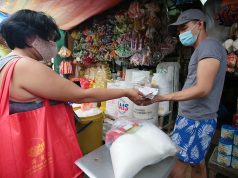Stock market may retest lows amid virus crisis
By Denise A. Valdez
Reporter
THE stock market may retest lows in the coming months as the full extent of the economic fallout from the coronavirus disease 2019 (COVID-19) pandemic has yet to be seen.
At the same time, bourse operator Philippine Stock Exchange, Inc. (PSE) expects only two to three initial public offerings (IPOs) this year from its previous target of about six.
COL Financial Group, Inc. Research Head April Lynn Tan said the PSE index (PSEi) may hit deeper lows in the coming months.
“I’m not really very optimistic at this stage. I don’t expect the strong performance so far to be sustained,” she said during Wednesday’s BusinessWorld Insights online forum.
On Wednesday, the PSEi closed at 5,626.25, up 22% from its low of 4,623.42 in March. Ms. Tan said the stock market’s rise was largely due to external developments such as the reopening of other economies as they seemingly “flattened the curve,” efforts by global central banks to boost liquidity, and other countries’ aggressive fiscal stimulus programs.
However, she said the stock market’s ascent may not be sustainable as the magnitude of the economic impact of COVID-19 has not been seen.
The Philippine economy contracted 0.2% in the first quarter, which only accounted for the first two weeks of the Luzon-wide enhanced community quarantine (ECQ). The second quarter is expected to be worse, as lockdown measures continued through April and May. There are also doubts the economy will be able to immediately bounce back to pre-lockdown levels.
Ms. Tan said stock valuations are currently cheap, but still far from previous bear market bottoms and therefore may still see some downside risks in the short term.
She also noted foreign investors continue to pull out funds from the local bourse, which is not a good indication as it is difficult for the PSEi to sustain a strong recovery without them.
“We’re still not yet there. There is room to go down,” Ms. Tan said.
While the 1997 Asian Financial Crisis and the 2008 Global Financial Crisis are commonly used benchmarks for the market’s current challenges, Ms. Tan noted those two are “regular garden variety type of financial crises,” while the current pandemic is nothing like what is taught and studied in school.
Philstocks Financial, Inc. Senior Research Analyst Japhet Louis O. Tantiangco said the current crisis involves economic and health problems that cannot be addressed at the same time.
“This is where the dilemma comes in. If you want to solve our health crisis, it would be at the expense of our economy. If you want to jumpstart the economy, bring us back to our full productive capacity, this will be at the expense of the health of the country,” Mr. Tantiangco said at the same online forum.
Given the gloomy outlook, PSE President and Chief Executive Officer Ramon S. Monzon said he is not very hopeful there will be many PSE listings this year.
“I think we would be lucky if we could get two or three additional companies to list at this time,” he said.
The PSE welcomed four IPOs last year and was initially hopeful for about six IPOs this year, along with two to three listings of real estate investment trusts (REIT) after it approved new REIT rules in January.
But more than four months into the year, the PSE only has a P1.6-billion IPO application from grocery operator MerryMart Consumer Corp. and a P15-billion REIT application from Ayala Land, Inc. (ALI).
“I think they will be more careful as far as going to the equity market is concerned,” Mr. Monzon said. He also said MerryMart is now in the process of book building and is targeting to list on June 15.
Despite the market’s volatility, Ms. Tan said both MerryMart and ALI may perform well in their offerings, as grocery businesses remain robust despite the pandemic while office leasing is resilient.
While the outlook remains dim, she said now is a great time for stock market investors to be “greedy” and plan for the long term. “I’m quite confident if you hold on to what you own right now, give it a year or two, we’ll probably be in a better position,” Ms. Tan said.
For Mr. Tantiangco, it is likely that the current crisis will have a lasting impact on market psychology, noting that investors may shy away from the market for now.
But he noted it may also usher in new economic trends where there would be bias for businesses catering to healthier lifestyles, those focusing on food sufficiency and sustainability, and those fostering growth in the digital space.
“Those companies which will be able to find opportunities out of these will likely be the new favorites of the market,” he said.



